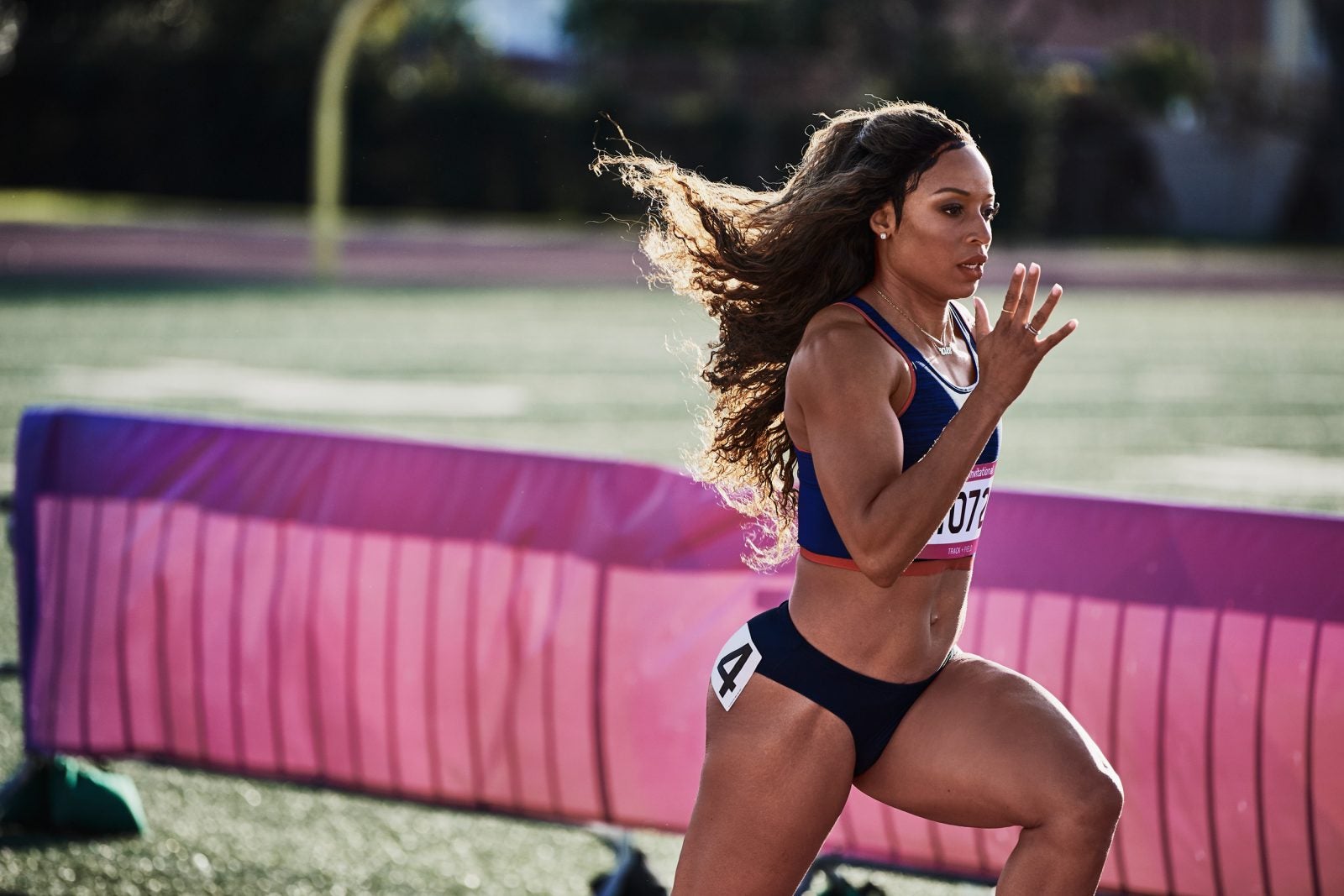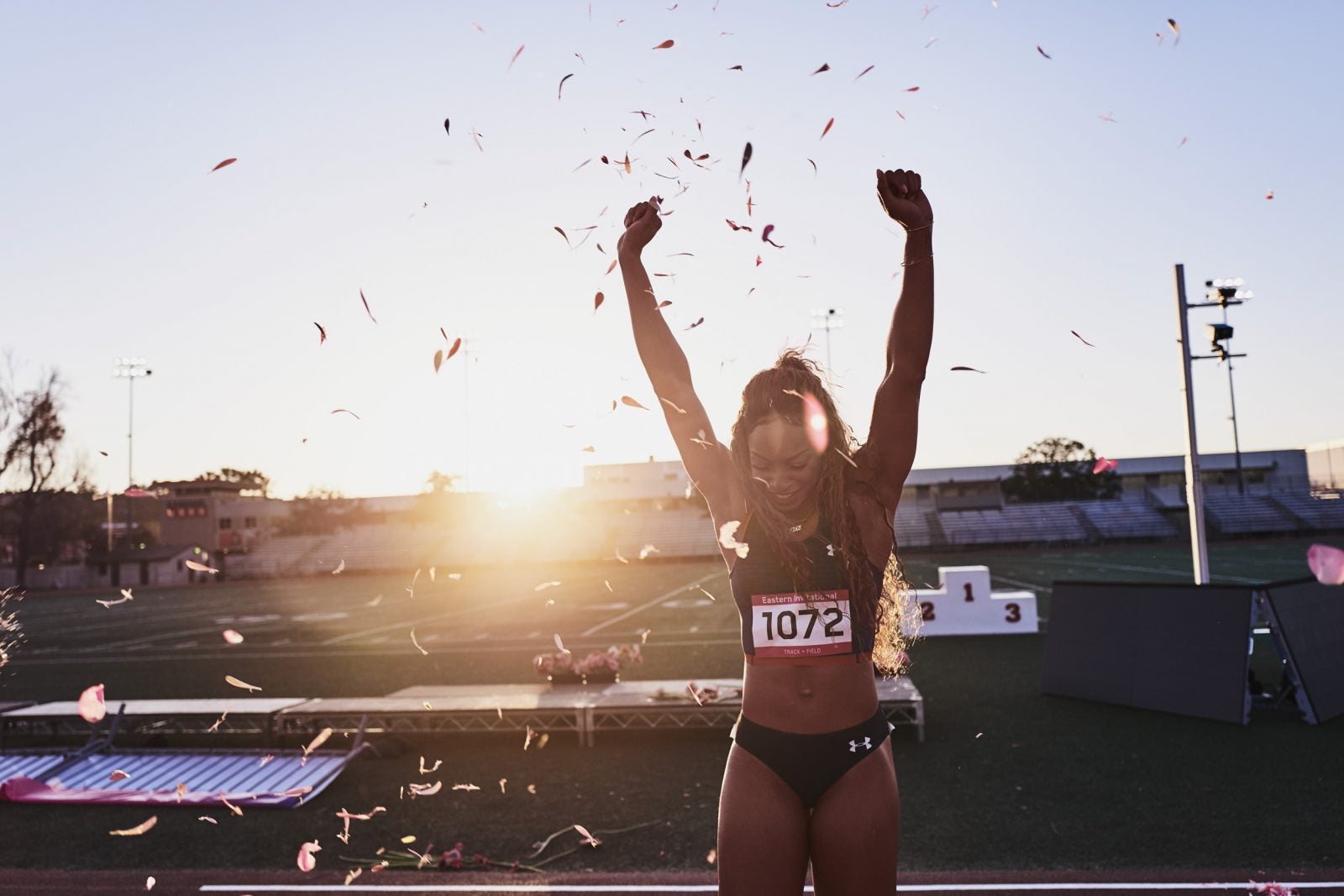
Before she was a gold medalist in the 4×400-meter relay at the 2008 and 2016 Olympics, Natasha Hastings grew up in a house with two parents who ran track. Her mother would always take her to meets and she would go to track practice with her father, who was a college coach. Now, she aspires to inspire by using her platform to show young Black girls that they can be anything in any field including and beyond sports.
“I try my best to be vulnerable and truthful about what my journey has been like. I try to stay away from only presenting the good,” Hastings told ESSENCE. “Failure is inevitable in any walk of life but, it’s about the lessons that you learn from failure and how you bounce back from those moments.”
Last year, Hastings was pregnant and felt the need to hide her pregnancy for five months before telling her Under Armour sponsors out of fear that her Olympic career would be in jeopardy. As it turns out, the brand was more than supportive, featuring the pregnant athlete’s story as part of their #ThroughThisTogether series last year. Now as the mother of a healthy baby boy, the Natasha Hastings Foundation founder is dispelling all stigmas surrounding Black motherhood, including the myth you have to choose between being a career woman and a mother.
ESSENCE caught up with Hastings to discuss her pregnancy as a Black female Olympian, why Black women athletes should not compare themselves to men, and what it means to protect Black women in sports.

In previous interviews, you expressed how you thought that you had to hide your pregnancy to succeed. Why did you feel that way?
HASTINGS: The culture in athletics really is, women don’t have kids [or] you wait until afterward. I know of some experiences where women in track and field have had their contracts either cut or put on hold. I was concerned about the continued support through my pregnancy, and after because I had heard stories of women not necessarily be supported. Right around the time that I gave birth, it became more public about what we have women faced.
I do also like to point out that it’s not just an athlete’s problem, but a woman’s problem, where women on the daily safety issue of starting a family versus not. Feeling anxiety or stress around your career is a normal thing because it’s so much of the unknown, but also there’s not really much to protect women who decide to start their families in the workplace.
What have been some of your biggest mental and emotional challenges as a Black female athlete?
HASTINGS: A lot of it is self-imposed, but something that we deal with. I became a single mom shortly after having my son and right around five or six months, his father and I broke up. I was feeling that pressure or that notion of being another statistic, but wanting to brush that narrative – much like the idea of coming back after childbirth and not giving up on myself. Having a child is a lot of responsibility; you definitely don’t have the liberty of making the same choices after having a baby. I think we all have in our minds a plan of what parenthood or our future is going to look like. When it doesn’t pan out quite the way you planned, it can be quite the challenge, even though it’s already challenging.

How did the height of the Black Lives Matter and #MeToo movements shake the rooms in sports, particularly for Black women?
HASTINGS: I am definitely encouraged by seeing the number of athletes that are willing to use their voice and platform. I think before, and still to some degree, there’s that pressure of, “I gotta show up the way that the companies want me to show up because if I use my voice too much, or if I speak up on certain things, I might lose their support.” I mean, Colin Kaepernick is the prime example, right? It’s tough because, while you do want to speak up and you do want to share. Not everyone is going to agree with your beliefs or even your experience. I think we all can agree as women and as Black women, a lot of times our experiences are minimized, or we’re being told that we’re being dramatic.
I’ve definitely seen the other side of it, where not everybody is happy to see you speak up, not everybody is happy to hear you use your voice. It’s really a personal choice, and even in that, I also had to decide what I was comfortable with. Comfortable from the standpoint of how do I protect my personal piece. Because not only do we live this, there were certain images that we were seeing day in and day out.
How do you see Black women changing what’s seen as the “men’s world of sports” and how do you hope to things continue to change?
HASTINGS: It’s important that sometimes you just have to get around people with the right ideas and not necessarily big numbers. I have been a huge advocate of more women telling our stories, more women being the decision-makers for us. I think there is something to be said about, not shying away from sharing what our experiences are as women. I hope that as we continue to move along, but we do have to acknowledge that we have come a long way. We’re not moving as quickly as we’d like to, but we are making progress and we just have to continue to make the progress. [I] hope that we can find a way to continue to tell our authentic stories and not necessarily be concerned with comparing ourselves to men, because it’s apples to oranges truly.
We hear the term protect Black women a lot. What does that mean to you and what does that look like in sports?
HASTINGS: Protect our peace and protect our mental health. I’ve been in therapy for about 13 or 14 months now. We as Black women sometimes wear our struggle as a badge of honor, and it shouldn’t be that way. I think really moving away from, “this is just what it is.” My mom did it, my grandmother did it, I’ll endure it, I’ll figure it out. How do we become better? How do we deal with our mental health and our issues in a healthy way? How do we get to voice our emotions and our feelings and our needs? A lot of the time, our needs are left last because we’re taking care of our families and our loved ones.
I think we have really normalized being that caretaker and not taking care of ourselves. Because of that, we get left behind. It’s about time that we bridge that gap and really move to fill that space in the mental health community and for ourselves. Learn how to communicate better, learn how to identify our own needs and share those needs and speak up for what it is that we need. We show up for everyone else; it’s time we start showing up for ourselves.







